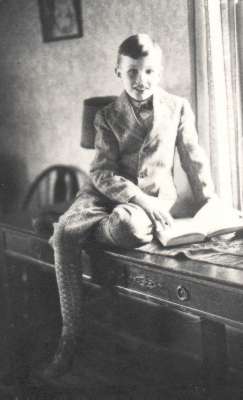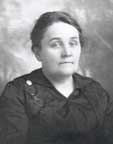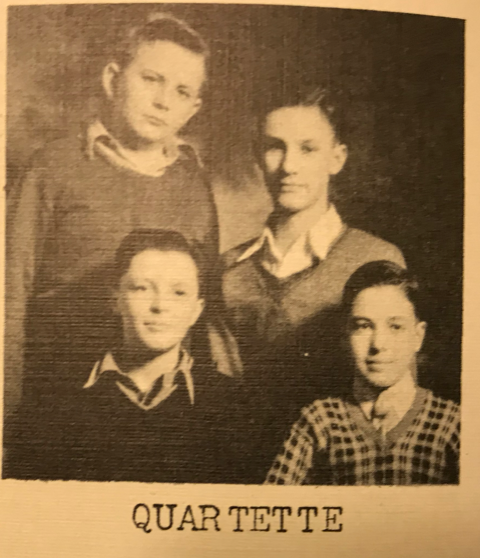Born To Be a Newspaper Man
by Martin J. McGowan Jr.
My Early Days
When I was 78 years old I happened to read the 75 years ago column in the Appleton Press and there it reported that my grandmother had taken me with her to visit a friend in Correll. That is the next town west of Appleton. It is easy to get there from Appleton now but in 1923 I wondered how we got there. My grandmother didn't drive a car and even if she did it would have been quite a jaunt over gravel roads laid out on section lines to get there. Maybe this friend lived on a farm near Correll but it would have still been a rough 10 miles each way. To me this is just another of life's mysteries.
A photo exists of me in this era. I must have been about five or six at the time. I judge that because the photo was taken in the McElligott house and we moved from that house when I was six. My grandmother had me all decked out in clothes typical of the time. I had long stockings over the knee, short trousers down to the knee, a jacket matching the trousers and my hair combed neatly.

She called in the town professional photographer, who posed me at a window with curtains behind, seated on the top of a large table. My left leg rested on the top of the table and my right leg was on top of that leg and hung over the table. I don't know why she went to such lengths to get a formal picture of me at that age.
At an early age my grandmother took me to Crookston to have some lessons in French from the nuns at a convent there. My aunt, Mrs. John McGowan, born Gilberte Sauve, had a sister in that convent.
My second-grade teacher, Edith Hindman, was a great teacher who taught us how to conduct meetings and take minutes. We used those lessons later for family meetings. Marty III also had Miss Hindman in second grade a generation later.
My grandmother was a joiner and an activist. She belonged to the American Legion Auxiliary, the Degree of Honor and the League of Women Voters. She played Bridge, quite often the version called Contract Bridge. In this variation something like a dozen boards were used with pockets in each corner. In those pockets hands had already been dealt and inserted. As the players sat at the table they removed the hands from the pockets and played them as they were dealt. The object seemed to be to compare how different people played the same hands. My grandmother seemed to be the custodian of the boards.
Another interesting thing my grandmother had was the Mah Jong game. The only way to describe them is dominoes with ivory faces having Chinese characters carved into them. I never understood the game but it was fun to play with the pieces.

As a youngster my grandmother taught me how to knit. This came in handy when I was ill. In the days before television she would give me yarn and knitting needles in bed to pass the time knitting and purling.
The earliest cultural event I can recall my grandmother taking me to attend was a performance by Negro singer and actress Ethel Waters. This occurred at either the Lyceum or Schubert theater in Minneapolis when I was about six or seven years old. We had front row seats but actually these were not good seats. They were lower than the stage. Unless I stood up I could not see the back of the stage but being there made quite an impression on me. I don't recall how we got to Minneapolis since it was quite a trip in the days before there was a real state highway system of surfaced roads and my grandmother did not drive a car. We must have taken a train, which would have been quite an experience for me at that age.
My first attempts at public speaking came at Christmas parties held by the Legion Auxiliary at their club rooms in the upper floor of the Appleton armory. Every youngster attending was expected to recite an appropriate Christmas piece. This had to be memorized in advance and delivered to the assembled children and mothers-in my case my grandmother. She always had me dressed up for the occasion. This went on for several years starting when I was about 10.
When I was seven years old Charles Lindbergh made the first solo airplane flight across the Atlantic. He became an instant hero. My first effort in reading books came as a result of his flight. A large book about his exploits is one I remember. I read other books about Robinson Crusoe, King Arthur and the Knights of the Round Table and other heroic stories.
Our second house was two blocks from the main street of Appleton. One corner in the middle of town was occupied by Meyers Grocery. This was an interesting place with shelves of groceries piled high to the ceiling. Customers would come in and give their order to a clerk who wrote the order on a pad of order forms. Then the clerk gathered the items from the shelves. To reach items on the top shelves the clerk took a long pole device that had a round clamp at the top and a way of controlling the clamp at the bottom of the pole. The clerk would then reach up, put the clamp around the items to be retrieved, clamp it and lower the item to the counter. I found this fascinating.
In those days grocery orders could be phoned to the store and delivered. At Meyers the delivery man was a high school student, Occie (Ockie) Lund, who let me ride with him as he made his rounds. The delivery vehicle was a Model T Ford with a covered area in the back to place the orders for delivery. I tried to be helpful as Occie made his rounds.
One block from our house was the ice house. Every winter ice blocks were sawed and cut from the river and then hauled to the ice house and stored in sawdust. This was in the days before refrigeration.
A friend of my father, L. A. Briggs, an entrepreneur who tried many businesses, like service stations, made a business out of delivering ice on a route to those who needed ice for their icebox. Older people continued to call their refrigerators iceboxes after refrigerators were invented.
Square cards containing numbers like 5, 10, 15 and 25 on each side were supplied to customers. They would then put the card in a window with the number of pounds of ice they wanted displayed on the top side of the card. Henry Maack was the delivery man who drove the ice truck. When he came to a customer's house he would look at the card in the window and haul out a chunk of ice from the truck, suspend it on a scale, wash off the sawdust and cut off enough to make the required number of pounds of ice. He would then haul the ice into the house and place it in the icebox. My friend, Bob Krebs, the banker's son, had a house with a small outside door on the back steps. Henry could put the ice in the icebox through that opening without entering the house. Some of us would follow Henry on his route in summer to get chips of ice knocked off the larger chunk. We would suck on those chips until they melted.
There is a sequel to this story about Mr. Briggs. He tried many things but never seemed to achieve the success he wanted. When Elmer Benson became Minnesota governor, Briggs thought he could get some kind of important job in the Benson administration through personal acquaintance with the governor. Apparently, Briggs became quite persistent about this and was turned away by Gov. Benson's keeper of the gate, Roger Rutchik. Briggs was quite disappointed by this. He had no business in Appleton and was living alone as a widower in Minneapolis. Obviously despondent at his situation, one day a few years later Briggs drove to Appleton, went to Riverview Park, sat down at one of the picnic tables, placed his hat on the table, put a gun to his head and committed suicide. He was found in the park the next day.
Years later I asked Gov. Benson about why Les Briggs, a personal acquaintance from his home town, was turned away without at least a visit to explain the situation. Gov. Benson said Rutchik had to maintain some order in the office and use the governor's time wisely. Rutchik was known to be a tough man to get past. This gained Gov. Benson much adverse publicity.
There was an annual event in the spring in Appleton called the Fathers and Sons Banquet sponsored by the Methodist church. Usually some boy in town in about the eighth grade was asked to speak and some father in town gave the response. One year it was my turn to give the talk for the sons. I didn't know how to put together a speech or what to say so I asked my father for some help. He wrote something not very long an I gave it. As I recall the theme was making decisions and he based it in a humorous vein. He suggested I say making decisions was something like the older man with a long beard. He always had a tough time deciding whether to sleep with his beard on top of the bed covers or under them.
More serious public speaking came during high school years when the school used to have what were called declamation contests. The slang term for it was declam. The contests were divided into three categories, oratorical, dramatic and humorous. I always entered the oratorical division. I must have started this extracurricular activity in junior high school and continued until I graduated. The material was usually memorized famous orations but later original material was used. I did well in some, not so good in others, but it was good experience.
There were class plays in the junior and senior years. I recall one of them was titled, "The Royal Family." This was a takeoff on the Barrymore family and was widely used for class plays. I don't recall which part I played.
In one of those years we had an operetta. It was something about Arabian Nights. Decked out in a bedspread with a headband to make me look like an Arab I got to sing a solo in that production.
For recreation in those years there was a lot of sliding down hills and skating on the nearby Pomme de Terre river. The street in front of our house was on a hill and our house was built just above the hill. Sliding on the street wasn't very safe but down our hill was all right until my father landscaped the hill and adjoining area. Then we had to resort to a hill farther away called Dunn's Grove hill. This was on the eastern edge of town near the community hospital operated by Dr. W. C. Kaufman. He owned the hospital and the nearby barn which housed his Pacer and Trotter harness racing horses.
As it turned out much later we purchased a home at the top of the hill across the street from the hospital. Our children benefited from that location because the man in charge of the horses would give our children rides on a sleigh in the winter and a wagon in good weather. There was a quarter mile track there and the rides were given to exercise the horses.
Much later the hospital was converted to apartments when it was closed and a new municipal hospital was built. The barn disappeared and the area became a high school athletic field.
Most of the sliding and skating were done with my good friend, Don Risch, who lived across the street. Although he was a year older, we had common interests. We would play cards in my room and we would play make-believe baseball games by throwing a rubber ball against the front steps and catching the rebounds. When I was a high school freshman our music teacher, Virginia Mills, asked Don and I and two eighth graders, Marvin Stavig and Vernon Peterson, to form a quartet to sing a song between acts of a class play. The song assigned to us was "Kentucky Babe." This was not a very difficult song but it had harmony.

When we marched out on the stage I thought I heard a few titters and laughs. We made quite a group. I towered over the others, even at that age. I believe I had the deepest voice so I sang bass. Don was the baritone and Marvin and Vernon sang tenor. We did well enough that our teacher decided to enter us in the district music competition. We worked hard on that piece, which was not considered suitable for competition but we used it anyway. We received a top rating in the district competition and went on to state competition. Despite our unusual appearance as a group and some snickers from the audience we carried off the song well and received an A rating.
When Don was a senior he was named editor of the school paper and I was named co-editor or assistant. After he graduated I was named editor. Our supervisor was the Latin teacher, Thora Martinson. I had started my senior year taking Physics instead of second year Latin. When at mid-year I discovered I needed two ears of a language to qualify for college admission I quickly started second year Latin. Because of my work on the school paper Miss Martinson really gave me a gift of a passing grade in Latin.
Don Risch and I made up two-thirds of the high school tennis team. The third member of the team was LaVerne Johnson, who lived at the foot of our hill. Don was a senior, I was a junior and LaVerne, whose nickname was "Cuke" for some reason I can't recall, was a sophomore. He had the powerful serve and played the single matches. Don and I played doubles.
There was once a tennis court on the school grounds but it was taken over for an elementary school. Our court was on a concrete top of some underground athletic rooms.
We played in the West Central conference at that time which consisted of Benson, Morris, Montevideo, Willmar, Litchfield and Sauk Centre. Appleton was the smallest school in the conference. During World War II, when I was covering sports for our paper and rode with the team to out of town games, it was decided that round trips of 175 and 190 miles were too long and used too much precious rationed gasoline. Appleton then joined a conference of smaller schools like Madison, Dawson, Ortonville, Montevideo, Benson and Morris, none more than 30 miles away.
Don and I played quite a bit of golf. I could always hit the ball farther than Don but my shots sprayed around, hooking and slicing. Don didn't hit the ball very far, but he was always straight down the middle of the fairway. After I wandered all over the course and when we finally met at the green Don could get the ball down in the hole in a stroke or two less than I could.
Don Risch was my closest friend through the years we were together in high school. We often double-dated. I called at his house so often the family said I didn't have to knock. Just come on in.
I graduated from Appleton High School in 1938. At that time we had a creative drama teacher, T. A. Blank, who designed a pageant inserted of the usual ceremony. The pageant was held on what was called "the slab" which covered the athletic department underground. I was the narrator for the pageant which depicted various events of history. As I recall the rain threatened the ceremony but we finished without getting wet. I don't recall if Don Risch's class had the first pageant for graduation in 1937 or we had the first one and the second one came after our class.
I claim I pointed out Don's future wife. After he came back from overseas duty in Egypt with the Office of War Information during World War II we met on a corner inn downtown Appleton. A pretty woman walked past us and Don asked who that was. I told him her name is Violet Wekseth, a new music teacher at school. They were married and our families remained strong friends to this day.
When Don developed tuberculosis and had to go to a sanitarium at Granite Falls we played chess by postcard. I was really moved when his son called to say he had died of a heart attack while out walking for exercise. I was saddened further when I was unable to attend his funeral because I was recovering from surgery.
Somewhere in my high school years when my father was elected to the Appleton city council the city engineer was looking for somebody to assist him in surveying new streets in the southeast part of town. I was available so I became the person who held the striped stake for the surveyor. This led to curbs and cutters and surfaced streets in that whole area which became the newest part of town and still is.
[ Family Pages ] [ Contents ] [ Previous Page ] [ Next Page ] [ Top ]